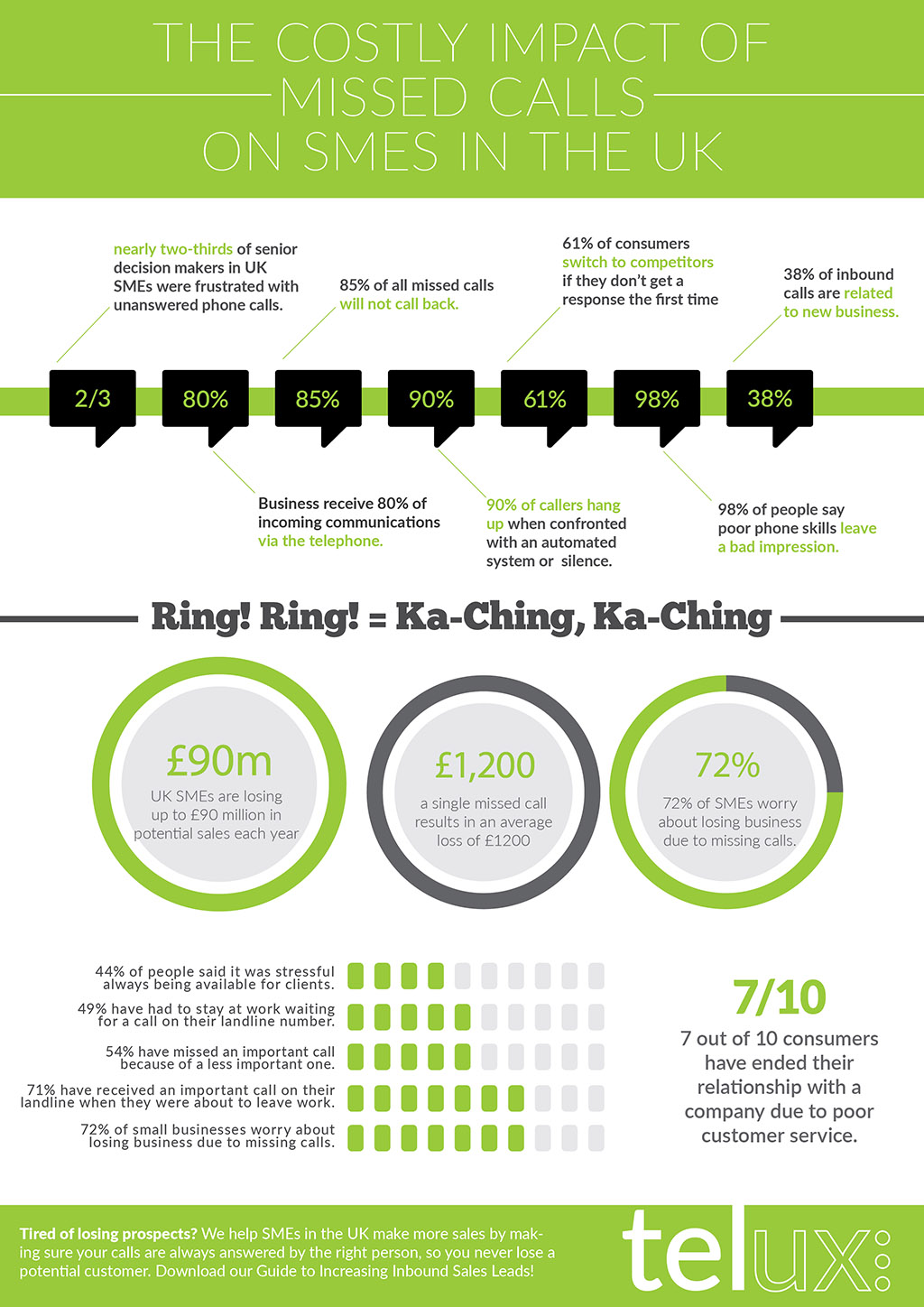How Missed Calls Are Costing You
According to the International Customer Management Institute (ICMI), over 60% of companies believe consistent mobile customer service is a strong competitive differentiator. Further research indicates similar trending patterns between the success of service call centres and the likelihood of maintaining a loyal client base.
Research findings suggest:
- 80% of all business communications take place over the phone (Telux HD)
- 85% of people whose calls are not answered will not call back (BT Business)
- 60%+ of customers will take their business elsewhere after a poor customer service experience (Harvard Business Review)
To avoid disappointing customers and risking losing their business, it’s important to know what is causing you to miss calls and what better phone service solutions there are. Read on for the true cost of a missed call and our suggestions on how to avoid them in the long run.

What Is The True Cost Of A Missed Call?
According to the Harvard Business Review, the average cost of a lost client is approximately £1,400. With over 60% of customers dissatisfied with their customer service experience likely to take their business elsewhere in the future, it’s more than a steep price to pay, especially if it can be avoided.
73% of companies with ‘above average’ Customer Experience maturity perform better financially than their competitors (Temkin Group), proving that it pays to be consistent.
Immediate financial detriment aside, there’s a less tangible cost to missing calls as well. Word of mouth and customer loyalty play a key role in establishing yourself as a reputable and consistent brand, and bad service can taint any good reputation. According to American Express (2017), customers tell an average of 15 people about a poor service experience, while they would only tell 11 about a good one.
Why Are You Missing Calls?
There are many reasons why you might be missing calls. Perhaps you have insufficient staff numbers to answer all your calls. Perhaps you have enough staff, but they’re busy with other customer service tasks like emails and direct chats.
It’s also possible that a customer is calling after your operating hours, or that you simply don’t have the right technology to handle the appropriate volume of customer service inquiries.
Whatever the case, be mindful of where you’re weakest so that you can adequately target how and why you’re missing calls.
What Are Better Phone Service Solutions?
If it’s financially feasible, hiring more staff to man the phones is the easiest solution for missed calls. Your existing employees might not have the time to answer every call that comes in, so hiring extra staff can help you avoid stretching your team too thin. Given how valuable person-to-person contact is for frustrated customers, it’s likely that the benefit of taking on another employee will make up for all dividends in the long run. Alternately, there are massive benefits to hiring virtual assistants, which can be up to 40% cheaper than hiring in-house staff.
Call forwarding can also serve as a solution to missed calls. Call forwarding will automatically send phone calls from unanswered office phones to your mobile, making sure that clients calling in aren’t sent to voicemail if it’s possible for you to take the call on the go instead.
If you do send clients to voicemail, make sure you have an optimised operating system in place. A single voicemail box may end up cluttered and messages may be lost, and an answering tree with too many branches can leave customers confused and irritated. By optimising your voicemail and call sorting systems, it helps ensure that every voicemail goes to the right place, and is heard by employees best equipped to handle the problem.
How Do You Properly Handle A Call If You Can’t Avoid Missing It?
The reality of a business is that you can’t always take a customer’s call, but there are proper ways to handle the situation if you do.
If there is no one available to answer the question at hand, take a message and schedule a call back. It’s better to answer the phone and get the information of the caller than to let the phone go to voicemail if the appropriate staff member is not available.
Return missed calls as soon as possible. If you can’t call them back right away, send their details to a colleague that can, and have them reach out to schedule a call.
Make sure to call people back even if they don’t leave a message – just because they didn’t leave a message doesn’t mean they don’t have a legitimate or important need. If they don’t answer, understand that you might have to return the call multiple times in order to get through to the caller.
Be Prepared
It’s inevitable that you’ll miss a call every so often, but being prepared is the best way to avoid any headache for both you and your clients down the line. To see how Balmer Limited can help, visit our Virtual Offices Services page, or call us at 01280 818777.




